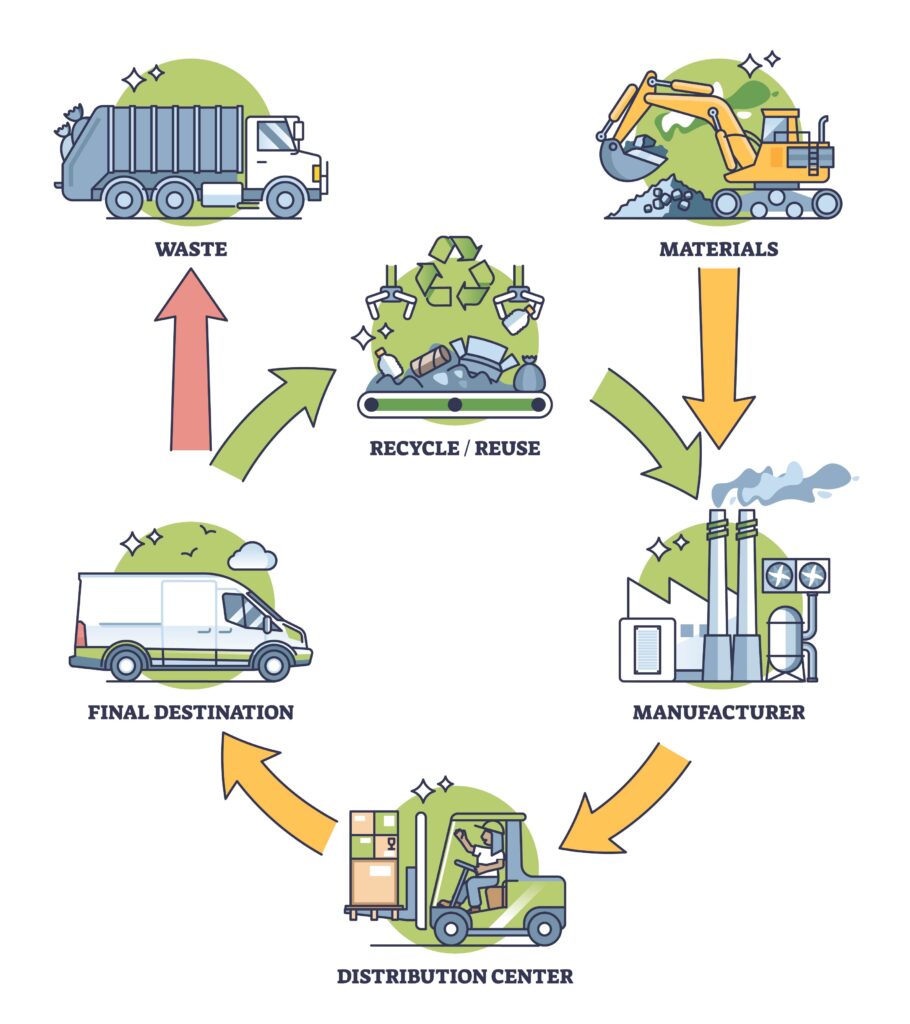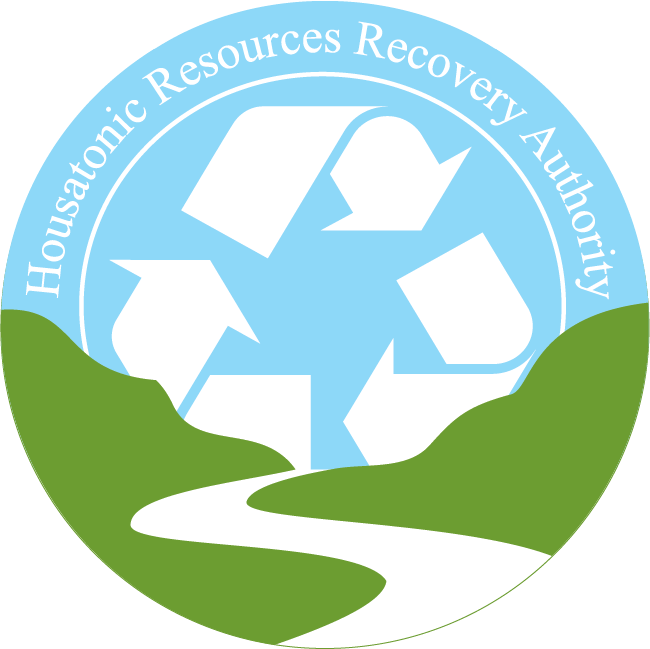Who Is Required To Recycle In CT?
Everyone! The Mandatory Recycling Act went into effect in CT on January 1, 1991. It applies to every business, every household, every institution and every government agency.
What Items Do I Have To Recycle?
Everyone in the State of CT is required to recycle the following items: glass food and beverage containers; metal food and beverage containers; newspapers; corrugated cardboard; leaves; scrap metal; used motor oil; lead-acid batteries; office paper, plastics #1 and #2, boxboard, grass clippings, nickel-cadmium batteries, televisions, printers, computers and monitors. See the What’s In? What’s Out? Mixed Recycling guide for which items go in your bin at the curb. Most other items can be recycled at your local drop-off center.
Are Any Other Items Recycled In The HRRA Region?
Yes. In addition to the recyclables mandated by the State, residents of HRRA communities can also recycle all the items listed on the mixed recycling flyer. In addition there are programs available for recycling paint, electronics, mattresses, thermostats and batteries.
Can I Put Plastic Grocery Bags In My Single Stream Recycling?
No. Return plastic bags to the recycling container in any grocery store in CT. While plastic bags are recyclable, they get caught on the gears and cause significant maintenance problems at single stream processing facilities. Plastic bags, aka film plastic, needs to be recycled in a plant that handles only plastic bags and should not be mixed in with single stream recycling.
How Can I Safely Dispose Of Sharps?
Dispose of used needles and other sharps in a sharps container specifically designed for that purpose. Containers may be available from your physician or pharmacist and are sold at medical supply stores and online. One convenient option is the mail-back program that allows for the return of filled sharps containers through the post office. The following are examples of mail-back programs:Sharps Disposal by Mail System, Sharps Disposal By Mail; GRP Medical Services Mail-Back Sharps Disposal; Stericycle Consumer Needle Disposal Serivces. Do not throw loose needles into the garbage and do not put sharps in recycling blue bags. Each year a number of garbage haulers in our region suffer unnecessary needle sticks because of the improper disposal of sharps. Additional information is available on the EPA website.
Where Can I Dispose Of Used Propane Tanks?
Used tanks can be taken to your local propane dealer or supplier or to one of the tank recycling companies on the list maintained by the CT DEEP. Those on the list in the greater Danbury area include Norbert E. Mitchell Co., Techair, and Federal Road Sunoco. Tank Recyclers, in partnership with Blue Rhino of New England recycles and re-certifies old grill tanks for return to the marketplace. Blue Rhino can be found at Home Depot, Lowes, K-Mart, and Wal-Mart . Do not throw your tank in the trash or attempt to remove its safety valve. Propane tanks are not accepted at regional household hazardous waste collections.
How Do I Recycle Used Motor Oil?
Used motor oil can be recycled at your local drop off/recycling center in every HRRA municipality except Ridgefield. In Ridgefield, the Town sponsors an annual motor oil collection day for residents every October. In the HRRA region, some Auto Zone stores also accept used motor oil for recycling.
What Types Of Batteries Must Be Recycled?
Lead acid batteries, such as car and truck batteries, should be recycled at your local drop off/recycling center. Nickel-cadmium (Ni-Cd) rechargeable batteries, such as those found in many electronics, cameras, and cell phones, should be recycled through the manufacturer’s take-back program. Just go to any of the participating retailers such as Best Buy, Cingular Wireless, The Home Depot, Lowe’s, RadioShack, Sears, Staples, Target, Verizon Wireless, and Wal-Mart. Check with the Rechargeable Battery Recycling Corporation for the location nearest you. Primary dry cell batteries, those that are thrown away after use such as AA, C and D cells, can be disposed of in your regular household garbage.
How Do I Dispose Of Used Paint Cans?
Oil based paint should be saved for the annual household hazardous waste collection in the region. Latex paint, the kind that cleans up with soap and water, is not hazardous. Although all paints are accepted at the Household Hazardous Waste collection events, paint can be dropped off at any participating paint recycling location. Visit www.paintcare.org for a location near you.
New To The Area And Wondering How To Start My Garbage Collection And Recycling Service?
In the HRRA region, garbage collection is done by private haulers. Visit our Municipal Solid Waste page for information on choosing a hauler. HRRA permitted haulers are required to maintain comprehensive liability insurance, automobile liability insurance and workers compensation insurance as required by law as a condition of their permit. All HRRA municipalities provide for a local drop off/recycling center where residents who don’t want to hire a private hauler can dispose of their garbage and recyclables. Most private haulers in the region pick up curbside recyclables on the same day as garbage collection. Newtown residents receive municipal recycling collection paid for by taxes. For more information about the Newtown municipal recycling program you may call 203-270-4300.
What Items Are Accepted At The Annual Household Hazardous Waste Collection?
Items accepted at the household hazardous waste collections include oil-based paints and solvents; glues and adhesives; automotive and marine products such as engine degreasers, brake fluid, gasoline; herbicides; insecticides; pesticides; hobby supplies; and items containing mercury such as thermometers and thermostats. For more information, see the complete list of items accepted as well as items not accepted or call HRRA at 203-775-6256 x304.
What Should I Do With My Household Hazardous Waste If I Won't Be In Town For The Collection Event Or If I Missed It?
If you are unable to get to the household hazardous waste collection scheduled for your community, ask a friend, neighbor or relative who is planning to go to the collection to take along your items or safely store your hazardous items for the following years collection. You also have the option to call a licensed hazardous waste transport and disposal company, but the cost is often prohibitive for individual homeowners. There are no facilities in the State of Connecticut at which residents of this region can drop off household hazardous waste except for the annual collections organized by the HRRA municipalities.
Why Doesn't HRRA Schedule More Household Hazardous Waste Collection Events?
The short answer is cost. More than 40% of the HRRA budget is designated for household hazardous waste collection costs. Funding to cover those costs comes from local tax dollars in the participating towns. With local budgets squeezed to keep property tax increases to a minimum, there are limited dollars available in every community to pay for household hazardous waste collection. By working together to hold collection events, HRRA municipalities help keep fixed costs to a minimum. You can help by supporting the household hazardous waste collection during your community’s budget process.
Where Can I Dispose Of Old Computers And Other Electronics?
Each municipality in the HRRA region provides a drop off location for all residential electronics that is free, convenient and accessible. In Bridgewater the location is the town garage. In Bethel, Kent, New Fairfield, New Milford, Newtown, Redding Ridgefield, Roxbury, Weston, and Wilton, e-waste can be taken to the local transfer station, recycling center or drop off center. Brookfield and Danbury residents can drop off e-waste at the City of Danbury Mom & Pop Recycle Center located at 307 White Street in Danbury. Sherman residents can take their electronics for recycling to the New Milford Recycling Center.
How Should I Dispose Of Old Prescription Medication?
Do not flush prescription medication down the toilet! Proper disposal that protects the environment is easy and cost effective as described in this guide from CT DEEP.
For one-day take back programs visit the U.S. Department of Justice Office of Diversion Control.
How Do I Dispose Of Items Not Discussed So Far?
Check out DEEP’s How Do I Dispose Of . . . website.

What Is Product Stewardship?
The growing product stewardship movement in the U.S. seeks to ensure that those who design, manufacture, sell, and use consumer products take responsibility for reducing negative impacts to the economy, environment, public health, and worker safety. These impacts can occur throughout the lifecycle of a product and its packaging, and are associated with energy and materials consumption; waste generation; toxic substances; greenhouse gases; and other air and water emissions. In a product stewardship approach, manufacturers that design products and specify packaging have the greatest ability, and therefore greatest responsibility, to reduce these impacts by attempting to incorporate the full lifecycle costs into the cost of doing business.
The terms product stewardship and extended producer responsibility (EPR) are often used differently. However, by speaking the same language, we can have a constructive public discussion. Here, we have attempted to harmonize terminology in the U.S.to help streamline the development of policies, legislation, and other initiatives:
Product stewardship
is the act of minimizing the health, safety, environmental, and social impacts of a product and its packaging throughout all lifecycle stages, while also maximizing economic benefits. The manufacturer, or producer, of the product has the greatest ability to minimize adverse impacts, but other stakeholders, such as suppliers, retailers, and consumers, also play a role. Stewardship can be either voluntary or required by law.
Extended producer responsibility (EPR)
is a mandatory type of product stewardship that includes, at a minimum, the requirement that the manufacturers responsibility for its product extends to post-consumer management of that product and its packaging. There are two related features of EPR policy: (1) shifting financial and management responsibility, with government oversight, upstream to the manufacturer and away from the public sector; and (2) providing incentives to manufacturers to incorporate environmental considerations into the design of their products and packaging.
HRRA is a member of the Product Stewardship Institute (PSI) Click here to visit their website.
